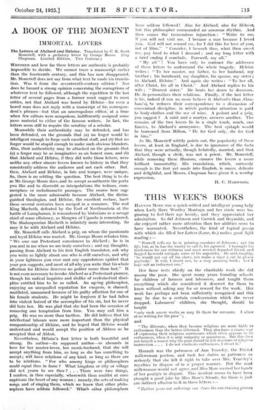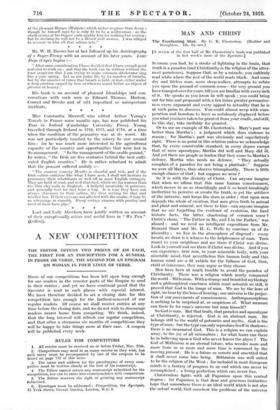THIS WEEK'S BOOKS
HANNAH MORE was a quick-witted and intelligent young lady when Lady Mary Wortley Montagu and her circle were be- ginning to feel their age keenly, and they appreciated her admiration. So did Johnson and Garrick and Reynolds, and she enjoyed rather more attention than her abilities seem to have warranted. Nevertheless, the kind of topical gossip with which she filled her Letters (Lane, 6s.) makes good light reading :- " Boswell tells me he is printing anecdotes of Johnson ; not his life, but, as he has the vanity to call it, his pyramid. I besought his tenderness for our virtuous and most revered departed friend, and begged he would mitigate some of his asperities. He said, roughly, he would not cut off his claws, nor make a tiger a cat to please anybody.' It will, I doubt not, be a very amusing book ; but I hope not an indiscreet one."
Her fame rests chiefly on the charitable work she did among the poor. She spent many years founding schools for children of farmers and labourers, and taught them everything which she considered it di screet for them to know without asking any fee or reward for the work. Her work has perhaps not been sufficiently recognized and this may be due to a certain condescension which she never dropped. Labourers' children, she thought, should be taught
"only such coarse works as may fit them for servants. I allow of no writing for the poor " ;
and
" The illiterate, when they become religious are more liable to enthusiasm than the better informed. They also have a coarse way of expressing their religious sentiments which often appears to bo enthusiasm, when it is only vulgarity or quaintness. But this does not furnish a reason why the poor should be left destitute of religious instruction . . . I do not vindicate enthusiasm, I dread it."
Hannah was the patroness of Ann Yearsley, the Bristol milkwoman poetess, and took her duties as patroness so seriously. that she felt it right to take over Mrs. Yearsley's royalties to dispose of in a proper manner. But the mad milkwoman would not agree, and Miss More washed her hands of her protegde in disgust. This incident seems to have been thought a good joke by Miss More's friends, for there is just one indirect allusion to it in these letters "Neither years nor sufferings can .'bate the entertaining powers
of the pleasant Horace (Walpole) which rather improve than decay ; though he himself says he is only fit to he a milkwoman : as the chalk stones at his fingers' ends qualify him for nothing but scoring ; but he declares he will not be a Bristol milk wcnian. I was 'obliged to recount to him all that odious tale."
* * * *































































 Previous page
Previous page